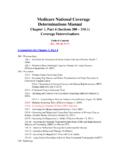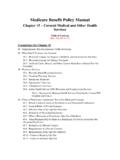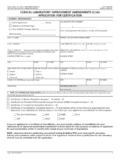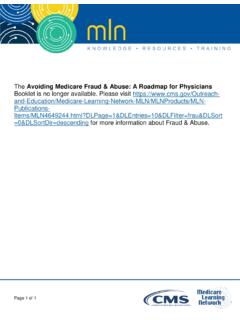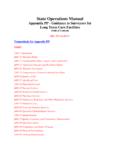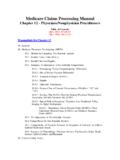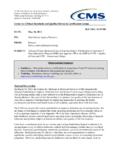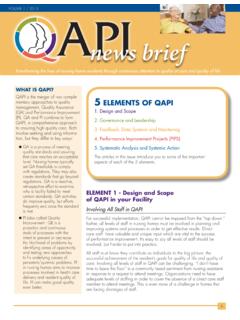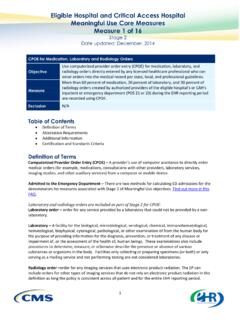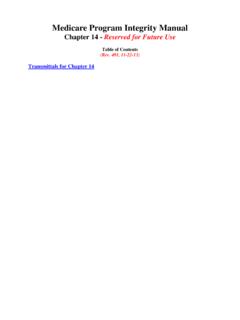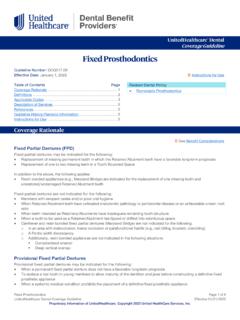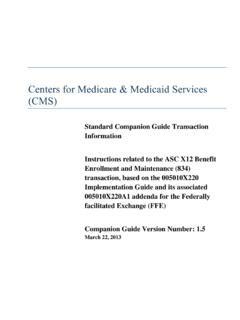Transcription of MEDICARE DRUG HEALTH PLAN CONTRACT …
1 DEPARTMENT OF HEALTH & HUMAN SERVICES Centers for MEDICARE & Medicaid Services 7500 Security Boulevard, Mail Stop C4-21-26 Baltimore, Maryland 21244-1850 MEDICARE DRUG & HEALTH PLAN CONTRACT ADMINISTRATION GROUP DATE: April 24, 2019 TO: MEDICARE Advantage Organizations FROM: Kathryn Coleman Director SUBJECT: Implementing Supplemental Benefits for Chronically Ill Enrollees The Bipartisan Budget Act of 2018 (Public Law No. 115-123) amended section 1852(a) of the Social Security Act to expand the types of supplemental benefits that may be offered by MEDICARE Advantage (MA) plans to chronically ill enrollees. We refer to these as Special Supplemental Benefits for the Chronically Ill (SSBCI). SSBCI include supplemental benefits that are not primarily HEALTH related and may be offered non-uniformly to eligible chronically ill enrollees, as discussed below.
2 We believe the intended purpose of the new category of supplemental benefits is to enable MA plans to better tailor benefit offerings, address gaps in care, and improve HEALTH outcomes for the chronically ill population. Section 1852(a)(3)(D)(ii), as amended, defines a chronically ill enrollee as an individual who: 1) has one or more comorbid and medically complex chronic conditions that is lifethreatening or significantly limits the overall HEALTH or function of the enrollee;2) has a high risk of hospitalization or other adverse HEALTH outcomes; and3) requires intensive care discussed in the CY 2020 Final Call Letter, for CY 2020, CMS will consider any enrollee with a condition identified as a chronic condition in section of Chapter 16b of the MEDICARE Managed Care Manual to meet the statutory criterion of having one or more comorbid and medically complex chronic conditions that is life threatening or significantly limits the overall HEALTH or function of the enrollee.
3 MA plans will not submit to CMS the processes used to identify chronically ill enrollees that meet the three pronged definition of chronically ill enrollee. However, all three criteria must be met for an enrollee to be eligible for the SSBCI authorized under section 1852(a)(3)(D) beginning CY 2020. CMS expects MA plans to document their determinations about an enrollee s eligibility for SSBCI based on the statutory definition noted above. In general, MA organizations have broad discretion in developing items and services they may offer as SSBCI provided that the item or service has a reasonable expectation of improving or maintaining the HEALTH or overall function of the chronically ill enrollee. MA organizations also have broad discretion in determining what may be considered a reasonable expectation when choosing to offer specific items and services as SSBCI.
4 CMS will provide supporting evidence 2 or data to an MA organization if CMS determines that an MA plan may not offer a specific item or service as a SSCBI because it does not have a reasonable expectation of improving or maintaining the HEALTH or overall function of a chronically ill enrollee. These benefits can be in the form of: Reduced cost sharing for MEDICARE covered benefits (such as to improve utilization), Reduced cost sharing for primarily HEALTH related supplemental benefits, Additional primarily HEALTH related supplemental benefits, and/or Non-primarily HEALTH related supplemental benefits. The special supplemental benefits available to chronically ill enrollees must be entered as a single SSBCI package in Section B19a and/or B19b of the Plan Benefit Package (PBP).
5 CMS-HCC or ICD-10 codes should not be included in the notes. The MA plan may require enrollees to participate in a care management program or use high value providers as a condition of reduced cost sharing or additional benefits. Plans may process the reduced cost sharing or additional benefits for chronically ill enrollees through retroactive reimbursement. Examples of Non-Primarily HEALTH Related Special Supplemental Benefits for the Chronically Ill As noted above, beginning CY 2020, MA plans will have the ability to offer a non-primarily HEALTH related item or service to chronically ill enrollees if the SSBCI has a reasonable expectation of improving or maintaining the HEALTH or overall function of the chronically ill enrollee. This expectation must be met for each item or service; the examples provided below assume that the reasonable expectation has been established that the item or service will improve or maintain the chronically ill enrollee s HEALTH or overall function.
6 Eligibility for SSBCI must be determined based on identifying the enrollee as a chronically ill enrollee, using the statutory definition, and if the item or service has a reasonable expectation of improving or maintaining the HEALTH or overall function of the enrollee. MA plans can provide non-primarily HEALTH related supplemental benefits that address chronically ill enrollees social determinants of HEALTH so long as the benefits maintain or improve the HEALTH or function of that chronically ill enrollee. MA plans may consider social determinants of HEALTH as a factor to help identify chronically ill enrollees whose HEALTH could be improved or maintained with SSBCI and they may use social determinants to further limit SSBCI eligibility. However, they may not use social determinants of HEALTH as the sole basis for determining eligibility for SSBCI.
7 The list below provides examples of non-primarily HEALTH related supplemental benefits for the chronically ill. All non-primarily HEALTH related supplemental benefits must be entered and briefly described as part of a SSBCI package in PBP Section B19b/13i. This list is not exhaustive: Meals (beyond limited basis): Existing guidance in Chapter 4 of the MEDICARE Managed Care Manual provides that meals are a primarily HEALTH related benefit (PBP category B13c) in 3 limited situations: when provided to enrollees for a limited period immediately following surgery, or an inpatient hospitalization, or for a limited period due to a chronic illness. In those situations, a meals supplemental benefit is permissible if the meals are: 1) needed due to an illness; 2) consistent with established medical treatment of the illness; and 3) offered for a short duration.
8 Meals may be offered beyond a limited basis as a non-primarily HEALTH related benefit (PBP category B19b/13i) to chronically ill enrollees. Meals may be home-delivered and/or offered in a congregate setting. Food and Produce: Food and produce to assist chronically ill enrollees in meeting nutritional needs may be covered as SSBCI. Plans may include items such as (but not limited to) produce, frozen foods, and canned goods. Tobacco and alcohol are not permitted. Transportation for Non-Medical Needs: Transportation to obtain non-medical items and services, such as for grocery shopping, banking, and transportation related to any other SSBCI, is a non-primarily HEALTH related benefit. Such transportation may be reimbursed, arranged, or directly provided by an MA plan as a SSBCI.
9 Pest Control: Pest eradication services that are necessary to ensure the HEALTH , welfare, and safety of the chronically ill enrollee. Services may include pest control treatment(s) or products that may assist the enrollee in the pest eradication ( , traps, pest control sprays, cleaning supplies). Indoor Air Quality Equipment and Services: Equipment and services to improve indoor air quality, such as temporary or portable air conditioning units, humidifiers, dehumidifiers, High Efficiency Particulate Air filters, and carpet cleaning may be covered as SSBCI. Plans may also include installation and servicing of equipment as part of the benefit. Social Needs Benefits: Access to community or plan-sponsored programs and events to address enrollee social needs, such as non-fitness club memberships, community or social clubs, park passes, and access to companion care, marital counseling, family counseling, classes for enrollees with primary caregiving responsibilities for a child, or programs or events to address enrollee isolation and improve emotional and/or cognitive function, are non-primarily HEALTH related benefits that may be covered as SSBCI.
10 Complementary Therapies: Complementary therapies offered alongside traditional medical treatment may be offered as non-primarily HEALTH related SSBCI. Complementary therapies must be provided by practitioners who are licensed or certified, as applicable, in the state in which they practice and are furnishing services within the scope of practice defined by their licensing or certifying state. Alternative therapies that are considered primarily HEALTH related may be offered by an MA plan as a supplemental benefit in PBP category B14c. Services Supporting Self-Direction: Services supporting self-direction allow enrollees to have the responsibility for managing all aspects of healthcare delivery in a person-centered planning process; while such services are a non-primarily HEALTH related benefit, they may have a reasonable expectation of improving or maintaining the HEALTH or overall function of 4 the chronically ill enrollee.
